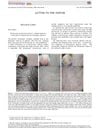 January 2022 in “Journal of Skin and Stem Cell”
January 2022 in “Journal of Skin and Stem Cell” Trichodynia is a painful scalp condition needing targeted treatments beyond symptom management.

Oral minoxidil is as effective and safe as topical minoxidil for treating female pattern hair loss.

People with Down syndrome have a higher risk of skin disorders and need better screening and treatment.
 July 2021 in “Australasian Journal of Dermatology”
July 2021 in “Australasian Journal of Dermatology” The trichoscopy-assisted hair pull test is useful for diagnosing different types of hair loss.
 February 2021 in “Journal of nursing education and practice”
February 2021 in “Journal of nursing education and practice” Women and men experience different quality of life and symptom distress after kidney transplant with immunosuppressive therapy.

Silk sericin dressing with collagen heals wounds faster and improves scar quality better than Bactigras.
 February 2020 in “International Journal of Research in Dermatology”
February 2020 in “International Journal of Research in Dermatology” EPDS is a rare, chronic scalp condition that's hard to treat and needs better awareness for improved outcomes.
 November 2019 in “Harper's Textbook of Pediatric Dermatology”
November 2019 in “Harper's Textbook of Pediatric Dermatology” Understanding normal hair growth and loss in children is key to diagnosing and treating hair disorders.
 October 2019 in “International journal of research in dermatology”
October 2019 in “International journal of research in dermatology” Misusing topical corticosteroids can cause skin darkening and other side effects.
 January 2019 in “Kocaeli tıp dergisi”
January 2019 in “Kocaeli tıp dergisi” People with chronic hair loss may have a higher chance of Vitamin B12 deficiency.
 January 2019 in “Springer eBooks”
January 2019 in “Springer eBooks” Acne is linked to inflammation and insulin resistance, and is associated with various syndromes that require different treatments.
 December 2018 in “Journal of Patan Academy of Health Sciences”
December 2018 in “Journal of Patan Academy of Health Sciences” Many Chinese patients lose hair after weight loss surgery, especially women, and taking iron and zinc on their own doesn't help.
 January 2018 in “Elsevier eBooks”
January 2018 in “Elsevier eBooks” The document concludes that alopecia has significant social and psychological effects, leading to a market for hair loss treatments.
 January 2018 in “Springer eBooks”
January 2018 in “Springer eBooks” Gender affects hair and scalp characteristics, with differences in hormone responses, graying patterns, and trace metals.
 January 2018 in “Elsevier eBooks”
January 2018 in “Elsevier eBooks” The document concludes that proper diagnosis and treatment of follicular disorders are crucial, with specific treatments for conditions like acne, drug-induced eruptions, and rosacea.
 January 2018 in “International journal of food and nutrition research”
January 2018 in “International journal of food and nutrition research” Intermittent iron and nutritional supplements can help reduce hair loss.
 January 2018 in “Springer eBooks”
January 2018 in “Springer eBooks” Hidradenitis Suppurativa is likely an autoinflammatory disease, and better understanding its causes could improve treatments.

Losing weight and eating better are key to managing metabolic syndrome and its related conditions.
 October 2017 in “The American journal of gastroenterology”
October 2017 in “The American journal of gastroenterology” Three patients suffered severe health issues due to not getting enough vitamins and minerals after weight-loss surgery.

Hair loss causes emotional distress, leading to high spending on treatments, with Minoxidil and Propecia being common but having side effects.
 May 2017 in “InTech eBooks”
May 2017 in “InTech eBooks” Some hair loss disorders cause permanent loss due to scarring, and treatments like steroids don't always work well.
 May 2017 in “InTech eBooks”
May 2017 in “InTech eBooks” Trichoscopy and trichogram are useful for diagnosing hair and scalp conditions.
 April 2017 in “InTech eBooks”
April 2017 in “InTech eBooks” Many people with hair loss experience scalp pain known as trichodynia, but the causes are unclear and treatments vary.
 January 2017 in “Journal of clinical & experimental dermatology research”
January 2017 in “Journal of clinical & experimental dermatology research” Low ferritin levels might be linked to telogen effluvium, but vitamin D levels are not.
 January 2017 in “Elsevier eBooks”
January 2017 in “Elsevier eBooks” Stress and hormones like progesterone can affect absence seizures, but their effects change with different life stages.
 December 2016 in “John Wiley & Sons, Ltd eBooks”
December 2016 in “John Wiley & Sons, Ltd eBooks” The document concludes that proper recognition and treatment of skin appendage disorders are important for management.
 September 2016 in “Princeton University Press eBooks”
September 2016 in “Princeton University Press eBooks” The document concludes that understanding health requires considering evolutionary perspectives on reproductive fitness, and recognizing the complexity of factors like diet, testosterone, and sexual orientation.

Female hair loss is often hereditary and can be treated with medication, hair transplants, and lasers.
 June 2016 in “CRC Press eBooks”
June 2016 in “CRC Press eBooks” Sleep problems and skin issues affect each other; poor sleep can worsen skin conditions, and some skin treatments can improve or harm sleep quality.
 January 2016 in “Springer eBooks”
January 2016 in “Springer eBooks” Understanding drug interactions, side effects, and patient-specific factors is crucial for effective dermatological care.






























